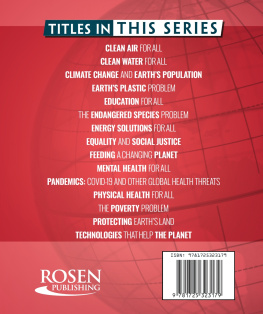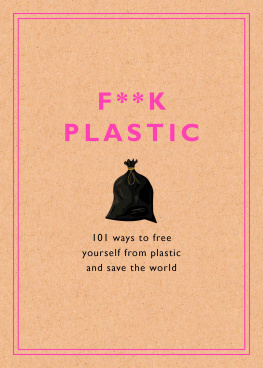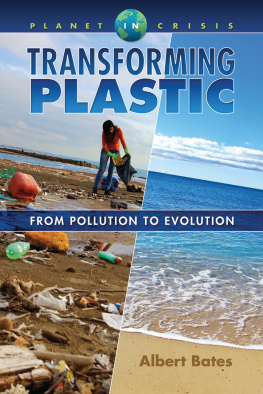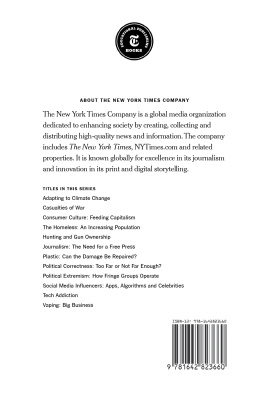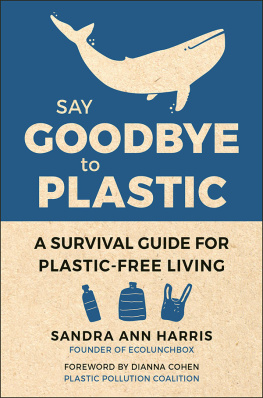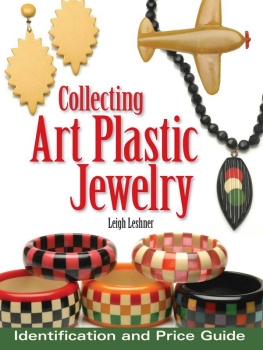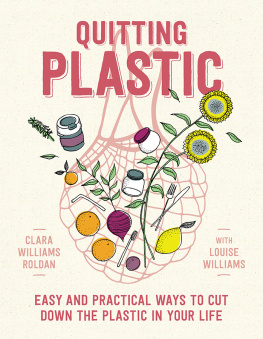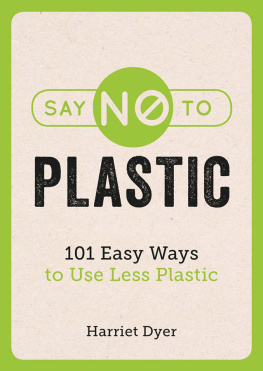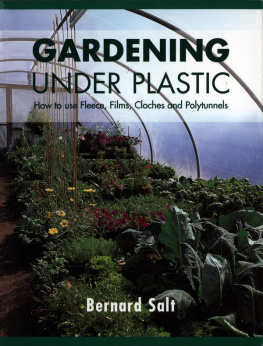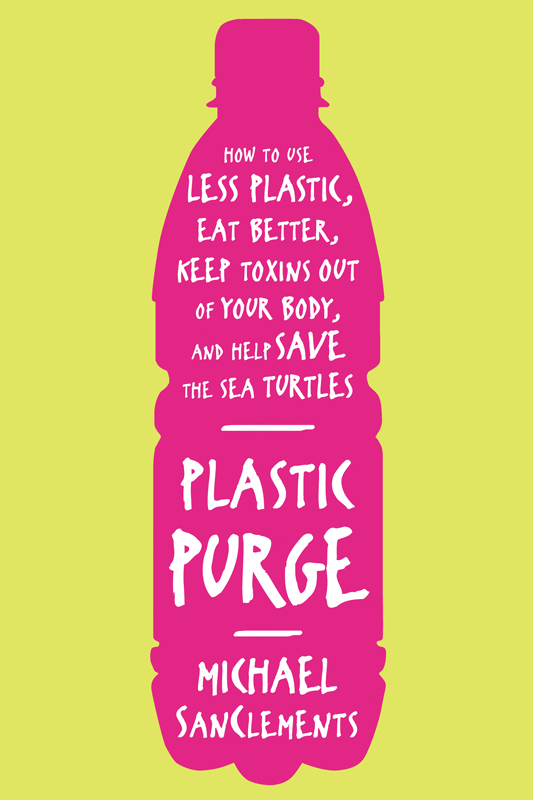
The author and publisher have provided this e-book to you for your personal use only. You may not make this e-book publicly available in any way. Copyright infringement is against the law. If you believe the copy of this e-book you are reading infringes on the authors copyright, please notify the publisher at: us.macmillanusa.com/piracy.
For Hadley
ACKNOWLEDGMENTS
First, I would like to thank Jasmine Faustino for contacting me and bringing this book to lifeyour guidance and friendship are truly appreciated! A huge thanks to Lindsay Edgecombe as wellI have enjoyed working with you tremendously and you are a fantastic agent. Also, thanks to Matt Martz for adopting the care of this book. Julia Suits made this book so much prettier with her wonderful illustrations. Many thanks as well to the good people at Grist for all they do and for giving me the opportunity to write about plastic in the first place. Much love and gratitude to Mary Perkins. Thanks for letting me sneak off for a year to write this book on top of a full-time job and never complaining about it. I owe you one. You are an amazing person and are going to be an amazing mother! Thanks to my family for always being there for me. You guys are the best and I love you so much.
The Laughing Goat coffee shop definitely deserves a mention, since I wrote nearly this entire book there. (Thanks for keeping me all hopped up on caffeine, Lauren.) Best coffee shop ever. Thanks to all my friends and my good dog Hank. Ella Levy, Basit Mustafa, and Sarah Elmendorf provided a lot of great banter that broke up the writing and made me laugh. Mary, Jesse, Ron, Ella, Sarah, and Dru provided input on the cover choice when I couldnt make up my mind. Lastly, a special nod to Iver Arnegard for never being too wet to sell the river. Thanks, man.
CONTENTS
PREFACE (AND HELLO)
Humanitys plastic footprint is probably more dangerous than its carbon footprint, said Captain Charles Moore, the man who discovered the Great Pacific Garbage Patch in 1997. OK, well, maybe he was wrong. But his statement still has something to teach us. First, theres clearly enough plastic in the middle of the ocean to freak Captain Charles right out, and second, its illustrative of our ability to let massive global problems like oceans filling up with plastic debris (or climate change, the biggest challenge humanity has ever faced) dissolve into the background noise of our day-to-day lives. I mean truly, how many of us can say weve given real thought to something as pervasive in modern life as plastic? Probably not very many.
Until recently, that included me, too.
Yup, I admit that until the past couple of years, I, too, hadnt given a tremendous amount of thought to societys and even my own plastic consumption, but now, well, I cant help but see it everywhere.
And since Im in confession mode here, truth be told, I never intended to learn this much about plastic, and I certainly never intended to write a book about it. Im writing this book largely as the result of a conversation I had in 2011 with some of the good folks at Grist.org, an informative (and snarky) environmental online publication. During that fateful conversation, I agreed to attempt to live without creating any plastic waste for two weeks. Prior to that conversation, Id never even considered such a thing. Even though I am an environmental scientist, such a possibility had never crossed my mind. At that time, my comprehension of plastics and the degree to which they have infiltrated and affect our lives can be described only as incredibly shallow.
Looking back now, Im blown away that the fact that our society is super-plasticized wasnt completely obvious to me. But once someone points it out to you, it becomes impossible to ignore. However, until that happens, it somehow manages to stay hidden without trying to hide. How does the saying go? The best place to hide something is out in plain sight. And thats precisely what plastic doesit hides out in the open right in front of us, getting into everything but rarely being noticed. Perhaps we cant see it anymore because its always been a part of our lives, so we just take it for granted.
There were definitely a few things I vaguely understood about plastic that just about anyone knows. For example, I knew to an extent that disposable plastic shopping bags were not so great. I also knew bottled water was a bad idea, but I hardly understood the full story. The ocean gyres and turtles choking on plastic debris were not news to me. Yet I was mostly clueless about the relationship between plastics and human health. But once I started looking into it, I began to see the whole picture so much more clearly. And let me tell you, once you start to see whats going on, closing your eyes again becomes impossible.
So who cares? Weve got plenty of problems. Why worry about plastic?
For starters, because plastic reminds me of an invasive species: it was introduced to solve a problem but did so with such enthusiasm that it created a host of worse ones. Im referencing the fact that plastic was, to a degree, born from an attempt to find a replacement for ivory used in billiard balls so more elephants could keep their tusks, and plastic bags were created to save trees by replacing paper ones. Plastic isnt inherently bad, but if you get too much, or just a little of the wrong kind, in the wrong place, then youve got a problem. And it just so happens that we have this exact problem in the wrong place: Earth, the only home we have.
Reducing our plastic usage isnt an insurmountable problem, not even close. It just takes a little understanding and someone to guide you through the various tips and tricks that can help you eliminate unnecessary and even harmful plastic from your life.
This book is broadly divided into four different sections designed to accomplish just that. The first part is a sweeping history of plastic that aims to explain when and why plastic became so ubiquitous in our lives. In the second part I cover some of the science behind our plastic usage. I address questions like: What resources are consumed to produce all our plastic? What are the human health and environmental effects of plastic? These are questions that have truly scary answers. The third part of the book lays down how I categorize plastic: the Good, the Bad, and the Ugly. Recognizing which category a plastic product fits into will help you figure out whether its the type of plastic you want to keep around, avoid completely, or try and use less of. And the fourth part of this book is a detailed guide to help you reduce plastic consumption, keep toxins out of your body, and spare Mother Nature the excess waste.
Earths population is currently right around seven billion, and should hit nine billion by 2050, which may seem like a really long time in the future, but isnt actually that far off. Regardless of whether or not you can comprehend the year 2050 or nine billion people, there is a simple truth inherent in these numbers. That truth is our planet is becoming a more crowded home with fewer resources. And unless we want increasingly worse resource shortages, we have to be increasingly diligent of how we elect to use those resources. Actually, we dont have to, we need to if we dont want our society to crumble, collapse, or morph into some very unpleasant place youd rather not have your children inheriting. In this new reality, we are going to have to think hard about opportunities for conservation and seize them. We cant be squandering precious resources on unnecessary and inefficient products or practices. Any opportunity we have to lessen the pressures on our environment, infrastructure, and population must be acted upon. This is where plastic becomes relevant. Many aspects of our throwaway lifestyle are exemplified by and depend upon single-use plastics and the numerous cheap plastic products we regularly consume. Its a terribly inefficient use of resources with an enormous footprint, and we need to tighten up our use of this kind of plastic as soon as possible so we have room for the plastic we really do need: the kind that greatly improves our lives.


